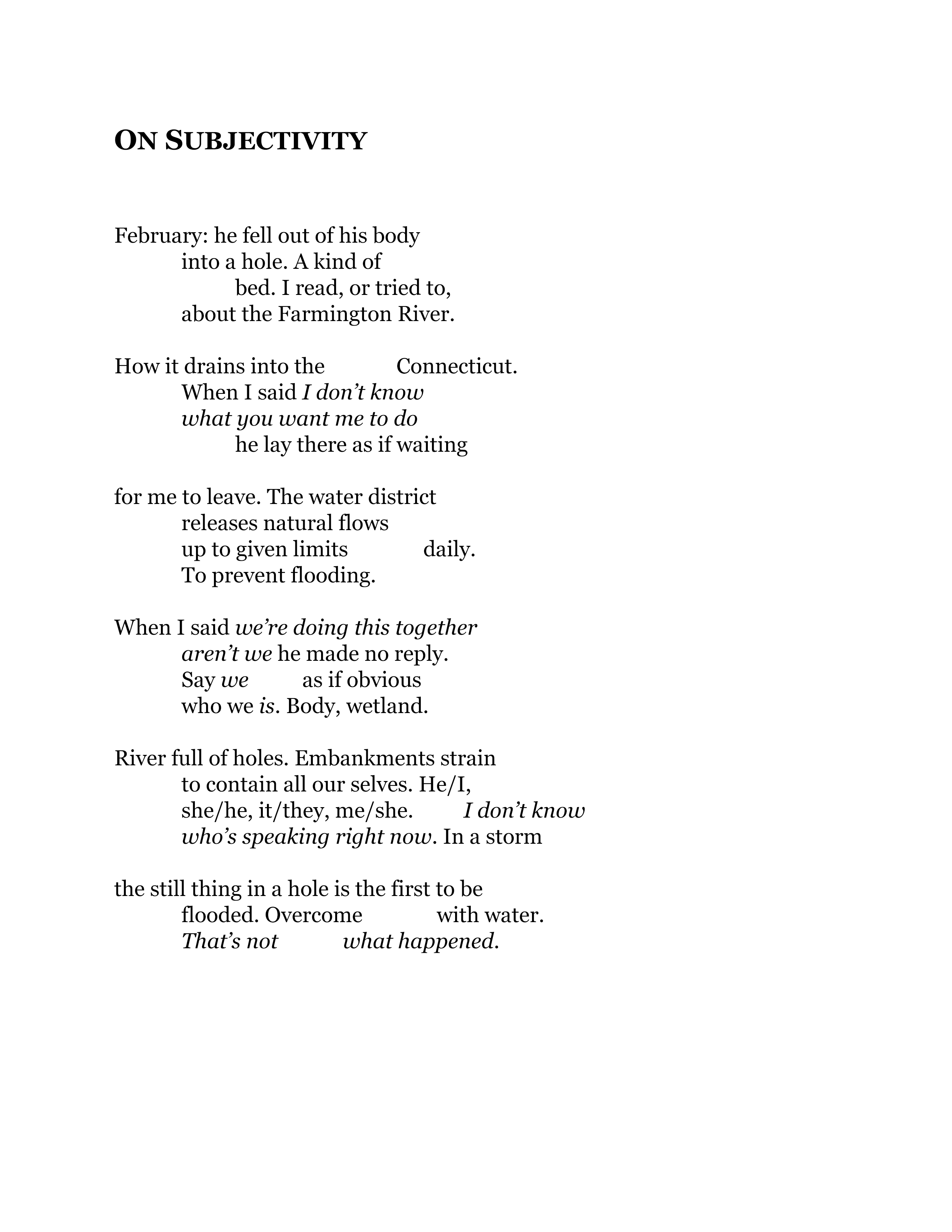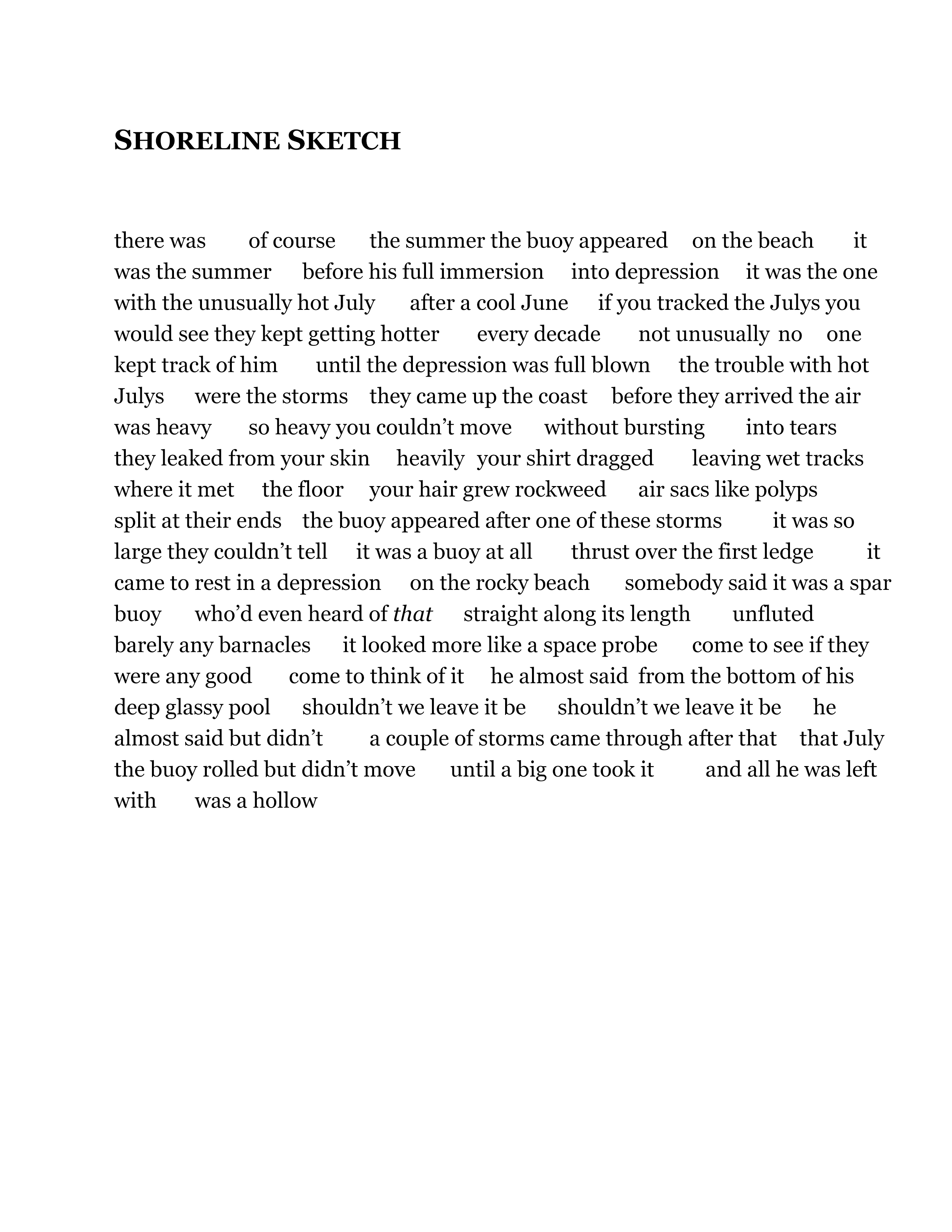4 poems by Shou Jie Eng
2 essays on the poems of Shou Jie Eng
Essay by Thomas Lynch
For most of a decade I taught, on occasion, with the Graduate Program in creative
writing at the University of Michigan. I was unqualified in almost every way, having no
academic preparation or education beyond what was required to get through
Mortuary School at Wayne State University, and to pass state and national board
exams en route to certification and eventual licensure in funeral service. My literary
interests were mostly home grown over the years of free range reading and
correspondence with writers I admired, chief among them, Michael Heffernan,
Richard Tillinghast, Keith Taylor, Linda Gregerson and in Ireland and the UK,
Matthew Sweeney, Macdara Woods, Robin Robertson, and others. Apparently the
powers in charge of the MFA program in Ann Arbor regarded my books of essays
and poems and stories as credentials enough to turn their young writers over to my
conference table and tutelage for three hours a week every other semester. Everyone
I taught was better equipped than me, at reading and writing and understanding works in words.
Which is likely why, after one of the workshoppers had read their fresh offering
– a poem or paragraphs of their own invention – I’d often begin by begging the
question: “can anyone tell me what’s happening here?” A textual endeavor relies on
the text itself, the words' worth is only on the page and the meaning we make of it is
limited to the author’s words, their structure and meaning. As a transaction between
reader and writer, the failure to connect, engage, discern meaning and motive, can
only be assigned to the reader or writer. The overage or shortfall belongs to one or
the other.
My curiosity about the poem, “Subjectivity” and the three “Shoreline Sketch”
(s) that accompany “Subjectivity” begins and ends as a textual intrigue. Why the
unconventional spacing between some words? Why the last page is justified right,
where the others follow usual patters for verse and sentences? Is there something I’m
missing? Meaning or portent? Are these prose poems or paragraphs? Does it
matter? What does the author intend?
A good poem, a good story, an essay worth reading, I used to preach to anyone
in earshot, should make the reader feel as if the writer has beckoned them to an
intimate conversation, a kind of fireside chat or park bench meditation, a colloquy
between people who share the same lexicon. Simplicity is not required, nor agreeable
topics. The unspeakable can be spoken with “authority.” The stuff of good writing
ranges between the mundane and the deeply mysterious.
So what exactly is happening here? Nuptials and love are implicated, a
honeymoon by the sea, a bonfire? A descent into dark depression, a death? A
suicide? This reader, hobbled no doubt by age and old ways, keeps wishing the
writer, the maker of these poems and sketches had shown us more. Quite possibly,
quite probably, however, the failure is mine. In either case, subjectivity
notwithstanding, the questions remain: I don’t know/what you want me to do. We’re doing this together/aren’t we. I don’t know/who’s speaking right now. That’s not what happened.
Essay by Scott Beal, on behalf of the Vice-Principals of Public School Poetry
Confronted in 1877 by an artwork he could neither understand nor abide, the critic John Ruskin famously accused the painter James Whistler of “flinging a pot of paint in the public’s face.” The painting, Nocturne in Black and Gold: The Falling Rocket, depicts a smoky evening scene in some sort of urban park in London. Cinders of an exploded firework rain over a lake as ghostly figures watch from shore. The details are hazy, with paint applied in strokes and splatters; you might call it, like one of these striking poems, a “Shoreline Sketch.” To my eye the painting is a gorgeous study of atmospheric dynamics between light and dark, equal parts awe and unease. But Ruskin championed a concept of “truth to nature” in art that urged fidelity to naturalistic appearances, and he was unwilling or unable with his eyes to see what Whistler’s work accomplishes.
Maybe this kind of disconnect is what my students have in mind when they say that art is “subjective.” But the maker of these poems insists on troubling that laissez faire, take-it-or-leave-it impression of subjectivity. The voice at the end of “On Subjectivity” insists “That’s not what happened.” We don’t know what anteceding “that” they are referring to; it’s a part of the conversation that the poem occludes, because it’s not the point. Something happened, and that’s a fact; but what that something was is in contention. The story has holes in it.
The poem does too – three of them. First: “he fell out of his body / into a hole.” Then: “River full of holes.” Finally: “In a storm / the still thing in a hole is the first to be / flooded.” The inertia of the “he” who has fallen out of his body is the inertia of someone paralyzed inside his subjective experience – which is a hole, and a bed, and a wetland. (Is that a way of saying what chronic depression is?) He lays there waiting; he makes no reply; and in the end he is “Overcome with water.” He questions “what happened” rather than engaging with what is happening, right up to the point where he may drown.
It's tempting to read the “he” in the second “Shoreline Sketch” as the same “he” from “On Subjectivity,” given “his full immersion into depression” and the way he almost speaks, but doesn’t, “from the bottom of his / deep glassy pool.” At least, that’s my subjective impression. I find the “sketch” a fitting vehicle for these poems because the clarities they allow us are provisional. In pursuing questions about how one form of deep connection (marriage) warps other forms of deep connection (friendship), or about how to be there for a suffering beloved, or how to measure our own goodness in relation to the world we encounter, our only answers are provisional.
As my friend Tom Lynch used to preach to anyone in earshot, a good poem should make the reader feel as if the writer has beckoned them to an intimate conversation, a kind of fireside chat on the shore, a colloquy between people who share the same lexicon. Although, I might add, sometimes we have to stretch our lexicons to engage in such conversational intimacy – by looking up the word “colloquy,” for example, or by squinting to see how Whistler’s splatters flare into frozen sparks. We have to listen and learn “who’s speaking right now.” These poems sing for us because we too are conversant in a lexicon of doubts. They welcome us to seek with the poet at the water’s edge and see what we might find.


